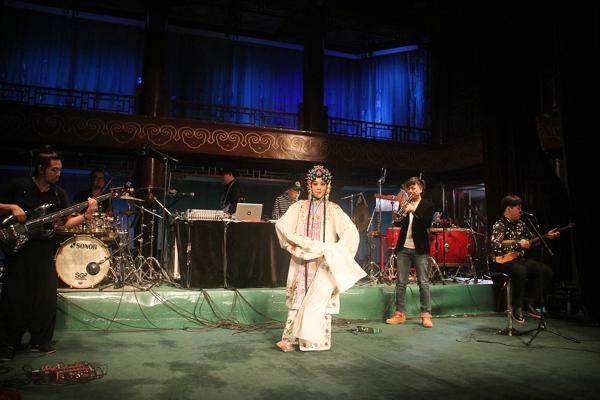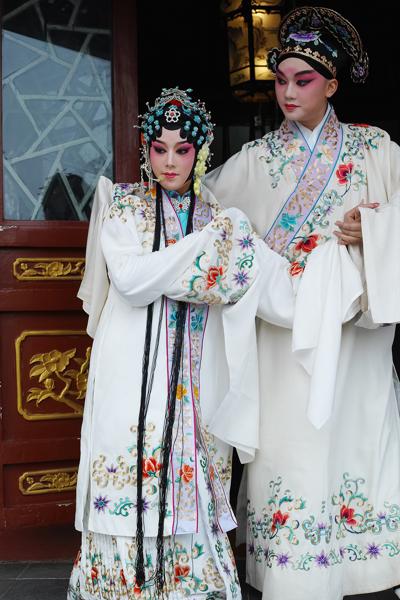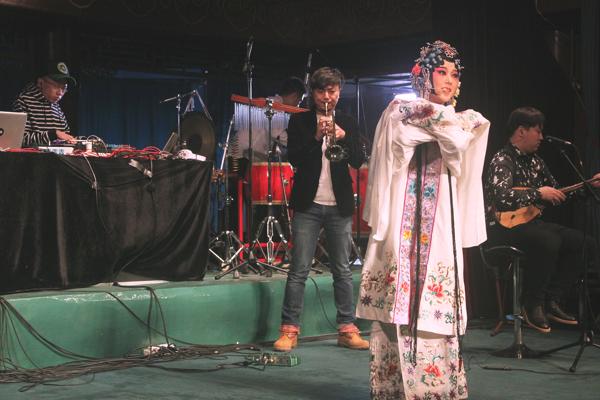
Performers of Chinese opera share the stage with musicians playing Western instruments such as the trumpet and drum in the show Chinese Music House, which is an experimental reinterpretation of the country’s ancient performing art.[Photo/China Daily]
It’s a Friday afternoon in Beijing’s Daguanyuan Theater.
The theater is inside a park, built in the 1980s, but inspired by the descriptions of Daguanyuan Garden in the classic novel A Dream of the Red Mansions. As the red curtain rises, Kunqu Opera performer Ma Jing walks slowly toward the center of the stage. Her exquisite garments, accessories and movements conjure up more images from the novel, a vision of scenic beauty and refined lifestyle.

However, the Kunqu Opera singing is not accompanied by the usual traditional Chinese instruments, such as the bamboo flute, pipa (four-stringed plucked instrument) and sheng (mouth-blown free reed instrument), but electronic music produced by a DJ followed by bass, drum and trumpet.

In a 30-minute section, four extracts from classic Kunqu Opera pieces, such as The Peony Pavilion, have been adapted into mesmerizing electronic and energetic rock songs.
It was a rehearsal for China Music House, a show that will be staged at Beijing’s Tango Club on May 2.
Also getting a revitalized staging: Pingtan, a traditional storytelling and ballad singing that originated in Suzhou, Jiangsu province, with a history tracing back to the Ming Dynasty (1368-1644).
Clad in long robes, well-known Shanghai Pingtan artists Gao Bowen and Lu Jinhua played pipa and sanxian (a three-stringed lute), and sang in Suzhou dialect with a DJ, guitarist and percussionist playing in the background.
Composer Lu Zhongqiang has spent the past three years on the show.
For Lu, 45, the idea of adapting traditional Chinese operas into contemporary music styles came from his mother, who is now 67 and was a Huangmei Opera performer before her retirement.
“I grew up in a courtyard, which was home to actors of Chinese operas. Though I didn’t learn any opera intentionally, it’s in my blood unconsciously,” says Lu, who learned to play the erhu (two-stringed bowed instrument) at the age of 3 with his father.
Lu is the founder of Beijing-based music label 13-Month, a company promoting local original folk and rock singer-songwriters since its establishment in 2006. After graduating from the music department of Nanjing Arts University, he has worked as producer for Warner Music China and CCTV’s popular touring concert series, The Same Song.
He is known for branding the series of live performances, Folk on the Road, which has included nearly all the popular folk-rock musicians in China.
During the past five years, more than 300 live performances were staged across China.
As for China Music House, which Lu describes as his latest ambition about music, he also wants to build it up into a brand, which he hopes will help revive traditional Chinese operas and attract young audiences.
“There are many crossover shows in the market. Some are made for commercial reasons, while some are just for attracting attention and winning awards. I do it because of my personal connection with traditional Chinese opera. It’s fun to witness the birth of a new music type,” Lu says.
“The situation of China’s music scene is that when a style gains wide popularity and makes money, then many people will follow that style and create similar music. It’s very boring. We need more variety than we have right now.”
If you go
8:30 pm, May 2. Third Floor of Tango Club, 79 Hepingli Xijie (west street), Dongcheng district, Beijing. 010-8589-7330.
